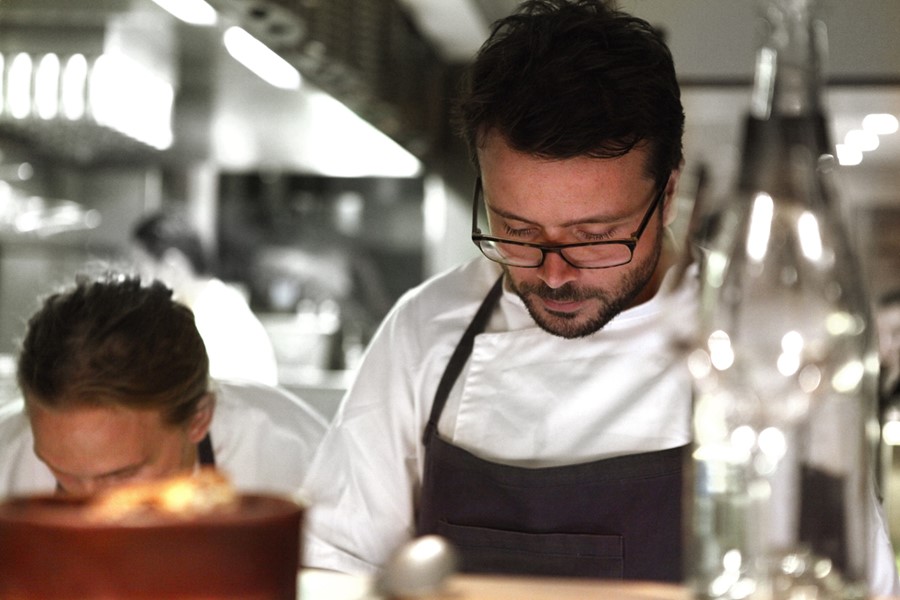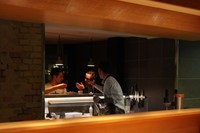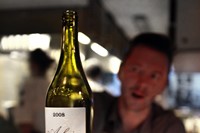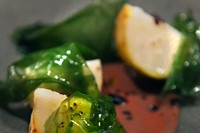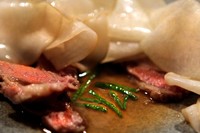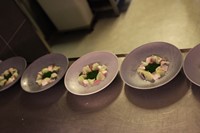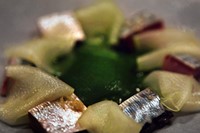Born in 1982, chef Christian Puglisi is redefining luxury with his restaurant Relae in the up-and-coming Nørrebro district of Copenhagen...
Born in 1982, chef Christian Puglisi is redefining luxury with his restaurant Relae in the up-and-coming Nørrebro district of Copenhagen. For this former Noma sous chef who has also worked at El Bulli, subtlety trumps elaborate presentation every time. Opened just over a year ago with partner Kim Rossen, also from Noma, Relae is already attracting an international clientele with its simple dishes, relaxed dining room and personalised jukebox (with heavy helpings of Johnny Cash). We spoke to Puglisi, who grew up in Sicily, about importing his gastronomic passion, how cooking is the most expensive form of artistic expression, and why vegetables are the new meat.
You’ve worked at some of the most influential restaurants in the world. Why did you decide it was time to open your own?
At one point if you start having too many opinions about what you're doing, you need to find your own place.
What sorts of opinions were you having?
On everything. How to set up the restaurant, how to make the food, how big the menu should be… You learn from what other people do and you learn from your own mistakes. That's the point I got to and realised it was time to try it out myself.
What was the idea behind Relae?
To create a restaurant where people could have a gastronomic experience but very much cut to the bone – free of any kind of exclusivity and the frame that’s put around the fine dining experience. We wanted a place where we could have freedom – a house for ourselves, because we work 80 hours a week so this should be somewhere my staff, colleagues and I like to be. Somewhere people can join us.
Keeping things relaxed and affordable, using quality ingredients, and attention to detail in your cooking – is this a new approach to fine dining?
For me fine dining is finished. It doesn't work with the values that people have now. Young people are interested in organic, wholesome food where the quality lies in the product. They're not interested in exclusive stemware and expensive lamps and chairs. They understand there are people behind this, not just big money. We don't have any investors here, it's our own place. We do what we want. There's no point in trying to open a three Michelin-starred restaurant with some business people if you don't want to be an instrument for somebody else's ambitions. If you're an artist you can live cheaply in some shit hole and paint whatever you want but if you want to have a restaurant, you need to spend a serious amount of money just in the setup, so I prefer to have a proper stove and second hand chairs.
Vegetables have a prominent place on the menu. Is that an important thing for you?
For me it's the kitchen of the future. It's very important that we all eat less meat – and better quality – both for health and environmental reasons. It's not that complicated to understand how to do it, you just have to have your mind-set. In Denmark organic meat is starting to come around but if a family sees a very bad industrialised chicken at the supermarket that’s inexpensive and an organic chicken that costs seven times more, they think they cannot afford to eat organic. But yes you can, you just can't eat chicken every fucking day. That’s how it used to be, if you talk to your grandparents, people couldn't afford meat all the time.
Celeriac, mackerel, some of the ingredients on the Relae menu may not seem exciting at first glance. Is it a hard sell?
For me if you make a personal kitchen you need to allow yourself to work with other things than what people find comfortable, to use ingredients that are overlooked – and you need a certain amount of curiosity to pull things off. By using our skills we present things differently but still keep it simple. That's very important.
How does the level of technique involved at Relae compare with what you were doing at Noma or El Bulli?
It’s important for me that the technique stays in the background, because we do have a lot of technique in what we do, but it shouldn't be the first thing you notice. That should be the flavours and taste. The movement from the last ten years was very much technique-led, and what you got in a lot of gourmet restaurants became a bit unnatural.
Why open Relae in Nørrebro?
I live very close by, and it's outside of the city centre, which is important for me also. I don’t want to have a walk-in restaurant because if you’re doing something that's a bit different you're much better off having people come to you. Nørrebro is the most densely populated part of Copenhagen. It’s smaller than any of the other areas and it’s the most ethnically varied. There's been a lot of trouble the last few years, but it's really coming around. For me it made sense to find a space on this street with the progressive people who are already here, to help pull it out of the gutter. Also in a couple of weeks we are opening a wine bar across the road called Manfred’s.
The revolution in Danish cooking must be interesting for you, coming from Sicily which has such a strong gastronomic tradition.
I came from a country where gastronomy was very important, to a country where it didn’t exist. But the thing is, nothing is different in Denmark, it's just that before if you had a good restaurant you looked to Paris and tried to do the same thing. All of a sudden Noma said ok, we want to do something that is completely ours. And it created something that you couldn't get in Paris, so people started coming to Copenhagen instead. And that's what everyone can learn from, not just using Nordic ingredients but the idea of doing something that is completely personal.
Text by Ananda Pellerin
Ananda and Neil visited Relae on Friday 26 August at 7:00pm. To see the other articles in The Hunger's culinary tour of Copenhagen see here.
Ananda Pellerin is a London-based writer and Neil Wissink is a visual artist also based in London. More from The Hunger, and contact The Hunger here.
